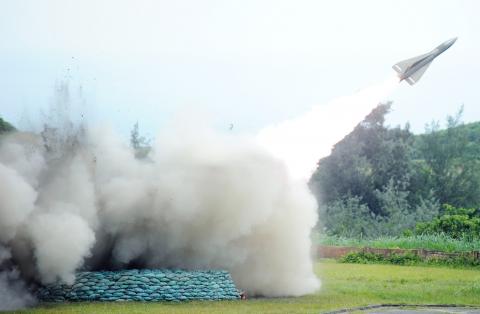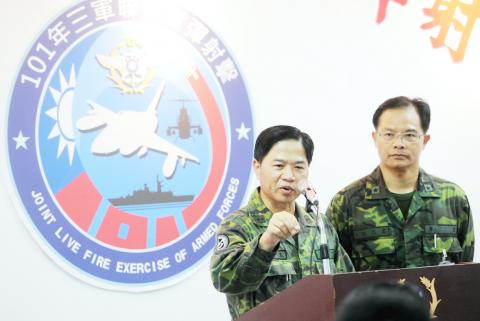The armed forces yesterday held a missile exercise in the south, substantially increasing the hit ratio from a similar drill in January last year with a 96 percent success rate.
In all, 26 missiles were fired from 12 platforms in the Joint Live Fire Exercise of the Armed Forces at the Chung-Shan Institute of Science and Technology (CSIST) missile test base in Jioupeng (九鵬), Pingtung County. Three services — the army, air force and navy — participated, with more than 2,300 soldiers mobilized for the exercise.
Things got off to a rather dispiriting start when the first two items on the agenda, the CSIST-developed Tien Kung II (TK-2) surface-to-air missile and a US-made ship-launched Standard Missile I (SM-1) surface-to-air missile, were canceled seconds before they were to be fired. Just over 15 minutes after successful intercepts by ground-launched Hawk and air-launched Tien Chien II (TC-2) and MICA missiles, a Hsiung Feng II (HF-2) anti-ship missile launch from a Lafayette-class frigate had to be canceled after a fishing vessel reportedly ventured into the naval exclusion zone.

Photo: Sam Yeh, AFP
Minutes later, a short-range HF-1, launched off a Jin Chiang-class missile corvette, hit its target, a decommissioned transport ship located 9 nautical miles (16.6km) into the Taiwan Strait.
From then on, the rest of the exercise went smoothly, with F-16-launched AGM-65 “Maverick” and AIM-9 “Sidewinder” missiles, and a “Ching Kuo” Indigenous Defense Force-launched TC-1, all hitting their targets in mid-flight. A ground-to-air version of the TC-1 also intercepted its target, while two AIM-9s launched by AH-1W Cobra attack helicopters hit their objectives.
Journalists cheered when the military announced that the HF-2 and SM-1 launches would now proceed, as the fishing vessel had cleared the area. While the SM-1, launched off a Perry-class vessel, intercepted its target, the HF-2 failed to hit home, missing another decommissioned transport ship 33 nautical miles at sea — the only miss that day.

Photo: Lo Pei-der, Taipei Times
During a press conference following the exercise, Ministry of National Defense officials said they were “quite satisfied” with the results, which enjoyed a 96 percent hit ratio.
A malfunction during the launch of two UK-made Banshee drones accounted for the aborted launch of the TK-2, officials said.
Turning to the presence of a fishing vessel, the military said 19 navy ships had been out at sea to secure the area, adding that one ship was sent out to force the intruders away from the area. The ministry confirmed the fishing vessel was foreign, but did not give their country of origin.
However, an official said that if Chinese ships had been present — during exercises in the past, China sometimes relied on fishing vessels to gather intelligence — some types of missiles would not have been launched.
The US-made AIM-7 “Sparrow,” which malfunctioned and dropped into the sea immediately after being launched during last year’s exercise, was excluded this year. The ministry said the US was still investigating the cause of last year’s failure and added that the decision not to include it had also been made for safety considerations, given the advanced age of the missile.
A ship-launched CK-3 Banshee drone also experienced technical failure and fell in Pingtung City, blowing a small crater in a road, officials said.
President Ma Ying-jeou (馬英九), who had expressed dissatisfaction after attending last year’s exercise, which scored a 68.4 percent hit rate with six misses from 19 missiles launched, was not present yesterday.

Tropical Storm Gaemi strengthened into a typhoon at 2pm yesterday, and could make landfall in Yilan County tomorrow, the Central Weather Administration (CWA) said yesterday. The agency was scheduled to issue a sea warning at 11:30pm yesterday, and could issue a land warning later today. Gaemi was moving north-northwest at 4kph, carrying maximum sustained winds near its center of up to 118.8kph and gusts of 154.8kph. The circumference is forecast to reach eastern Taiwan tomorrow morning, with the center making landfall in Yilan County later that night before departing from the north coast, CWA weather forecaster Kuan Shin-ping (官欣平) said yesterday. Uncertainty remains and

SEA WARNING LIKELY: The storm, named Gaemi, could become a moderate typhoon on Wednesday or Thursday, with the Taipei City Government preparing for flooding A tropical depression east of the Philippines developed into a tropical storm named Gaemi at 2pm yesterday, and was moving toward eastern Taiwan, the Central Weather Administration (CWA) said. Gaemi could begin to affect Taiwan proper on Tuesday, lasting until Friday, and could develop into a moderate typhoon on Wednesday or Thursday, it said. A sea warning for Gaemi could be issued as early as Tuesday morning, it added. Gaemi, the third tropical storm in the Pacific Ocean this typhoon season, is projected to begin moving northwest today, and be closest to Taiwan on Wednesday or Thursday, the agency said. Today, there would likely

DISRUPTIONS: The high-speed rail is to operate as normal, while several airlines either canceled flights or announced early departures or late arrivals Schools and offices in 15 cities and counties are to be closed today due to Typhoon Gaemi, local governments announced last night. The 15 are: Taipei, New Taipei City, Taoyuan, Tainan, Keelung, Hsinchu and Kaohsiung, as well as Yilan, Hualien, Hsinchu, Miaoli, Chiayi, Pingtung, Penghu and Lienchiang counties. People should brace for torrential rainfall brought by the storm, with its center forecast to make landfall on the east coast between tonight and tomorrow morning, the Central Weather Administration (CWA) said. The agency issued a sea warning for the typhoon at 11:30pm on Monday, followed by a land warning at 11:30am yesterday. As of

CASUALTY: A 70-year-old woman was killed by a falling tree in Kaohsiung as the premier warned all government agencies to remain on high alert for the next 24 hours Schools and offices nationwide are to be closed for a second day today as Typhoon Gaemi crosses over the nation, bringing torrential rain and whipping winds. Gaemi was forecast to make landfall late last night. From Tuesday night, its outer band brought substantial rainfall and strong winds to the nation. As of 6:15pm last night, the typhoon’s center was 20km southeast of Hualien County, Central Weather Administration (CWA) data showed. It was moving at 19kph and had a radius of 250km. As of 3pm yesterday, one woman had died, while 58 people were injured, the Central Emergency Operation Center said. The 70-year-old